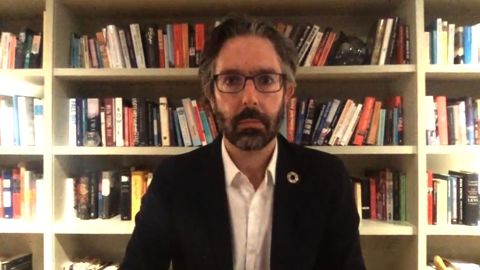Read Transcript EXPAND
PAUL VAN ZYL, CO-FOUNDER, THE CONDUIT: The worker-support program announced on Friday, which will provide up to 80 percent of workers’ income, up to a cap of 2,500 pounds a month, has enabled us to offer a furlough package to almost all of our workers. And that means that our staff and our team, when this crisis is over, will be able to return to work, and we will not have designated this incredibly skilled, highly talented group of people. And the holidays on VAT and on rates is really, really important. A loan — set of loan packages that might be available in the days ahead to help businesses bridge this unprecedented economic cataclysm is very, very important. And just breaking news, Christiane, I am told, and I hope that I can — it can — it will be confirmed in the minutes ahead — was that the chancellor has announced that there will be a rent moratorium for the next three months. And that was something that this week was a looming crisis for tens of thousands or hundreds of thousands of small businesses in the hospitality sector, who were due to pay rent this week, and who had had their basic income completely decimated by the forcible closure.
(CROSSTALK)
CHRISTIANE AMANPOUR: Yes, what would that have meant for you? I mean, that’s a pretty big breaking news. And I know you and others have been very concerned about the absolute legal demands to pay your rent to your commercial landlords. So if you’re getting a break on, that’s clearly great. What might you have had to do? What would have happened if you had not had that break or if it doesn’t get announced?
VAN ZYL: Well, we would have been in a very, very perilous position.
And, as I say, thousands and thousands of other hospitality businesses would have been facing the cliff edge of rent in a couple of days. And they would have had to make very hard choices around going into administration, declaring bankruptcy, not being able to continue. And you sometimes have to rely on the goodwill of landlords or the reasonableness of landlords. And not all landlords are thoughtful. Not all landlords are going to take a long-term view about their tenants. And so, therefore, thankfully, the government has stepped in and provided this breathing space. And we have been a thriving business. For the first two months of this year, our businesses beat all of its forecasts and has been both achieving its kind of profit objectives, but also its deep social mission.
About This Episode EXPAND
Christiane Amanpour speaks with doctors, politicians, diplomats and business people about the state and effects of the coronavirus crisis.
LEARN MORE


